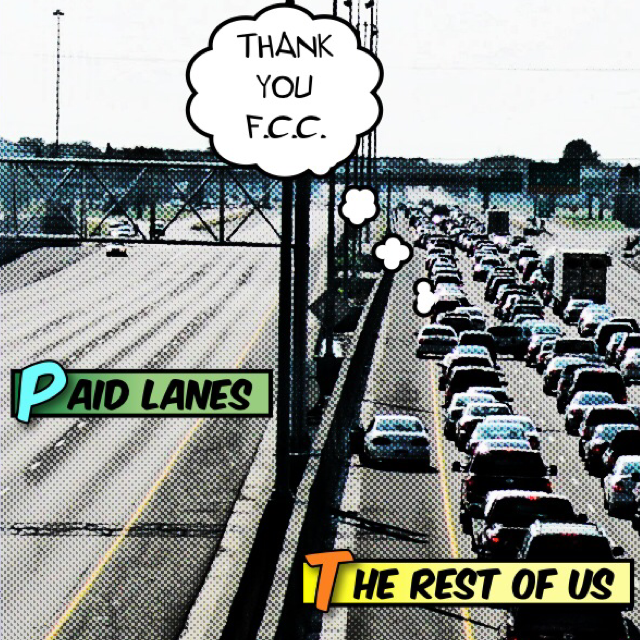If you aren't aware of "net neutrality" or how it affects you, it is now time you take notice. First, consider the Internet like a huge Autobahn of data traffic. There are no speed limits. There are no tolls. Data is free to flow from any starting point to you without discrimination. In other words, when you open your web browser, whether you are accessing a small company's website or Amazon.com, data from each is not hindered by a third party. It's a remarkable freedom we have enjoyed since the beginning of the Internet, and one that is greatly responsible for the massive number of innovations we have seen over the past years.
Unfortunately, that freedom may end, and we need to act.
To continue the analogy, imagine that the data freeway has off-ramps to your house. These off-ramps are controlled by your cable or telephone company. By law, they have to provide you equal access to all data coming through the freeway, and since they are a regulated duopoly (most of us only two options for service providers, which we accept rather than having 10 cable boxes in our yard), their prices are set.
All of this is regulated by the Federal Communications Commission, or FCC.
Earlier this year, a US federal court limited the ability of the FCC to regulate the off-ramps to your home, allowing telephone and cable providers to potentially create traffic lanes of slow and high speed data and sell them to the highest bidder.
According to technology venture capitalist, Fred Wilson:
Companies like Netflix could pay to be in the fast lane, allowing you to indulge in weekend-long marathons of House of Cards without interruptions and buffering. It also means that bootstrapped start-ups, without the resources to access the fast lane, would be relegated to the slow lane or, possibly, no lane at all to your home or business.
Personally, I have rarely had a problem accessing Netflix, YouTube or even Amazon. I interpret this move as less about allowing consumers to better access popular sites and more the ability of large corporations to limit the access to their smaller competitors.
You decide, but ultimately it will hurt all of us.
Here's what we need to do (again, from Fred Wilson).
Unfortunately, that freedom may end, and we need to act.
To continue the analogy, imagine that the data freeway has off-ramps to your house. These off-ramps are controlled by your cable or telephone company. By law, they have to provide you equal access to all data coming through the freeway, and since they are a regulated duopoly (most of us only two options for service providers, which we accept rather than having 10 cable boxes in our yard), their prices are set.
All of this is regulated by the Federal Communications Commission, or FCC.
Earlier this year, a US federal court limited the ability of the FCC to regulate the off-ramps to your home, allowing telephone and cable providers to potentially create traffic lanes of slow and high speed data and sell them to the highest bidder.
According to technology venture capitalist, Fred Wilson:
The FCC has responded to a court ruling by proposing a convoluted set of rules that will allow fast lanes, slow lanes, and what’s even worse, no lanes. The FCC’s proposal will allow the telcos and cable companies that provide the last mile connection to your home or office to prioritize some bits over others. That’s how they create the fast lane and the slow lane. It also allows discrimination in which they can decide not to allow your bits through at all, creating a “no lane”.What does this mean?
Companies like Netflix could pay to be in the fast lane, allowing you to indulge in weekend-long marathons of House of Cards without interruptions and buffering. It also means that bootstrapped start-ups, without the resources to access the fast lane, would be relegated to the slow lane or, possibly, no lane at all to your home or business.
You decide, but ultimately it will hurt all of us.
Here's what we need to do (again, from Fred Wilson).
- Sign this White House Petition before May 15th "voicing" your stance against allowing cable and telco companies to sell the off ramp to your house to the highest bidder.
- Show your support to Internet activists who are building the opposition to fast lanes and slow lanes. These include Net Neutrality 101 and Fight for the Future.
- You need to watch the FCC’s proposed rules that will be aired to the public on May 15th to see if they are going to consider “reclassification”. If they do not, we all need to rise up and go into action against these proposed rules. Because without “reclassification”, the FCC really cannot protect us from the last mile duopolies who are hell bent to build these lanes on the Internet and destroy the golden era of Internet innovation that we have experienced over the past twenty years. We cannot allow that to happen.

No comments:
Post a Comment